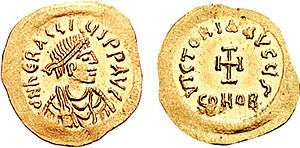610
Year 610 (DCX) was a common year starting on Thursday (link will display the full calendar) of the Julian calendar, the 610th year of the Common Era (CE) and Anno Domini (AD) designations, the 610th year of the 1st millennium, the 10th year of the 7th century, and the 1st year of the 610s decade. The denomination 610 for this year has been used since the early medieval period, when the Anno Domini calendar era became the prevalent method in Europe for naming years.
| Millennium: | 1st millennium |
|---|---|
| Centuries: | |
| Decades: | |
| Years: |
|
| 610 by topic |
|---|
| Leaders |
| Categories |
|
| Gregorian calendar | 610 DCX |
| Ab urbe condita | 1363 |
| Armenian calendar | 59 ԹՎ ԾԹ |
| Assyrian calendar | 5360 |
| Balinese saka calendar | 531–532 |
| Bengali calendar | 17 |
| Berber calendar | 1560 |
| Buddhist calendar | 1154 |
| Burmese calendar | −28 |
| Byzantine calendar | 6118–6119 |
| Chinese calendar | 己巳年 (Earth Snake) 3306 or 3246 — to — 庚午年 (Metal Horse) 3307 or 3247 |
| Coptic calendar | 326–327 |
| Discordian calendar | 1776 |
| Ethiopian calendar | 602–603 |
| Hebrew calendar | 4370–4371 |
| Hindu calendars | |
| - Vikram Samvat | 666–667 |
| - Shaka Samvat | 531–532 |
| - Kali Yuga | 3710–3711 |
| Holocene calendar | 10610 |
| Iranian calendar | 12 BP – 11 BP |
| Islamic calendar | 12 BH – 11 BH |
| Japanese calendar | N/A |
| Javanese calendar | 499–501 |
| Julian calendar | 610 DCX |
| Korean calendar | 2943 |
| Minguo calendar | 1302 before ROC 民前1302年 |
| Nanakshahi calendar | −858 |
| Seleucid era | 921/922 AG |
| Thai solar calendar | 1152–1153 |
| Tibetan calendar | 阴土蛇年 (female Earth-Snake) 736 or 355 or −417 — to — 阳金马年 (male Iron-Horse) 737 or 356 or −416 |

Emperor Heraclius (610–641)
Events
By place
Byzantine Empire
- October 4 – Heraclian revolt: Heraclius arrives with a fleet from Africa at Constantinople. Assisted by an uprising in the capital, he overthrows and personally beheads Emperor Phocas. Heraclius gains the throne with help from his father Heraclius the Elder. His first major act is to change the official language of the Eastern Roman Empire from Latin to Greek (already the language of the vast majority of the population). Because of this, after AD 610, the Empire is customarily referred to as the Byzantine Empire (the term Byzantine is a modern term invented by historians in the 18th century; the people of the Empire itself always referred to themselves as "Ρωμαῖος" — tr. Rōmaios, Roman).
Europe
- The Avars invade the Duchy of Friuli, an important buffer between the Kingdom of the Lombards in Italy and the Slavs.[1] During the fighting Gisulf II dies and his duchy is overrun (approximate date).
- King Witteric is assassinated during a banquet at Toledo, by a faction of Catholic nobles. He is succeeded by Gundemar, duke of Narbonne, who becomes king of the Visigoths in Hispania.[2]
- King Theuderic II loses Alsace, Champagne and Thurgau to his elder brother Theudebert II of Austrasia. His Burgundian army is defeated east of the Jura Mountains against the Alemanni.
- The Volga Bulgaria arises on the territory of modern Russia, being the first civilisation in the region to avert from the Early Slavs (approximate date).
Britain
- Selyf ap Cynan succeeds his father Cynan Garwyn as king of Powys (Wales).
By topic
Arts and sciences
Religion
- Muhammad, Islamic prophet, begins secretly at 40 years old to preach a new religion which will be called Islam. According to Islamic teachings, the angel Gabriel appears to him in a cave on Mount Hira near Mecca (Saudi Arabia) and calls him: "The Prophet of Allah". Muhammad gathers followers, reciting to them the first verses of al-Alaq (surat Iqra), thus beginning the revelation of the Qur'an.[3]
- Pope Boniface IV presides over a Council of Rome for the restoration of monastic discipline. Attendees include Mellitus, first bishop of London.[4]
- Columbanus and Gallus begin their missionary work in Bregenz, near Lake Constance (Switzerland).[5]
- John V (the Merciful) becomes patriarch of Alexandria (approximate date).
Births
- Anania Shirakatsi, Armenian astronomer (d. 685)
- Barbatus, bishop of Benevento (approximate date)
- Ergica, king of the Visigoths (approximate date)
- Grimoald, King of the Lombards (approximate date)
- Lai Ji, official of the Tang dynasty (d. 662)
- Nanthild, Frankish queen (approximate date)
- Safiyya bint Huyayy, wife of Muhammad (approximate date)
Deaths
- October 5 – Phocas, Byzantine emperor
- Gisulf II, Lombard duke of Friuli (approximate date)
- Heraclius the Elder, Byzantine general
- Tassilo I, King of Bavaria (b. 560)
- Waraka ibn Nawfal, the paternal first cousin of Khadija, the first wife of the Islamic prophet Muhammad.
- Witteric, king of the Visigoths
gollark: Also having ridiculous amounts of entirely arbitrary knowledge on things.
gollark: For some reason.
gollark: As they say, wearing glasses automatically makes you seem very smart.
gollark: Me too!
gollark: Wait, this is just brackets.
References
- Thomas Hodgkin, Italy and Her Invaders' (vol. 5), p. 160
- Isidore, chapter 58; translated by Guido Donini and Gordon B. Ford, p. 27
- Essential Histories: The Great Islamic Conquests AD 632–750 (2009), David Nicolle, p. 22. ISBN 978-1-84603-273-8
- Brooks "Mellitus (d. 624)". Oxford Dictionary of National Biography
- Edmonds, Columba (1908) "St. Columbanus". The Catholic Encyclopedia 4. New York: Robert Appleton Company. Retrieved 15 January 2013
This article is issued from Wikipedia. The text is licensed under Creative Commons - Attribution - Sharealike. Additional terms may apply for the media files.